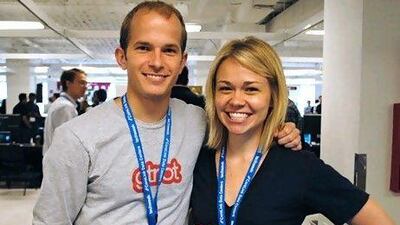During forays to all seven continents, Brittany Laughlin was frustrated she couldn't more easily tap her friends' social network feeds for travel tips and recommendations.
After an extensive search of tech companies incorporating travel, Ms Laughlin found a site called Gtrot, which is accessible worldwide.
Following a few emails initialised by reporting a bug on the site, she met the site's founder and chief executive, Zach Smith. Ms Laughlin had some ideas to expand the business and, after a lengthy meeting with Mr Smith, was named a co-founder.
Gtrot, which marries travel with social networking by tapping into Facebook to organise travel plans shared by friends, started as an entry by Mr Smith in Harvard University's annual Innovation Challenge in 2009. Gtrot won and used the US$15,000 (Dh55,095) purse to launch the site in private beta.
"Facebook does a great job of showing you who your friends are. But figuring out where they are, and who's been where, is what we're trying to solve," says Ms Laughlin, 25, a New York University graduate who left a corporate job at American Express to become an entrepreneur. "In one click you can see and connect with your friends who live in the city you're going to."
Ms Laughlin believes Gtrot is unique in utilising Facebook, with users' permission, to gather travel data from friends. Users are informed of where their friends have gone in the past and where they're going in the future. In this way, Gtrot is "much more of a connection between people".
The site targets web-savvy 18 to 35 year olds who use social media as a means of communication, and who average two to 10 trips a year. Gtrot caters to each and every trip the user logs, whether it's international or a local tourist destination.
More than 10,000 users have registered online since the company was publicly launched last May.
At the same time Gtrot announced it had closed its first institutional funding round of "just under $1 million", from Lightbank, a venture capital firm based in Chicago whose first portfolio company was the online venture Groupon.
Since then Gtrot has started a campaign of geographically-targeted offers, from daily deal sites such as Groupon and Living Social, in 103 cities in the US, UK and Australia. The company is set to launch a new product with even more targeted offers from Groupon, says Ms Laughlin.
More than 114 million Americans will research travel online this year, and 94 million will book it, according to a recent report by industry research firm eMarketer. Online sales of leisure and business travel in the US is expected to increase 8.5 per cent this year to $107 billion, up from $99bn last year.
Gtrot is looking to attract 50,000 users by the end of the year.
"We'd love to see 10,000 trips added and up to a million trips added by the end of next year," says Ms Laughlin, who is focused on user acquisition rather than revenue at this point.
As part of its expansion plans, Gtrot is looking to add two more staff to its team of eight by the end of the year. Ms Laughlin admits that finding technically-adept employees who mesh with the small unit is difficult. The key is getting people who are "able to develop, design and think of big ideas and tackle big problems".
The company's major obstacle is "cutting through the noise" of the thousands of travel companies in cyberspace.
"I think one of the challenges is letting people know this is something different and worth checking out," Ms Laughlin says. "We're doing something different at Gtrot where we allow sharing, and this social component, that we haven't seen elsewhere on the Web on travel."
* Reuters

